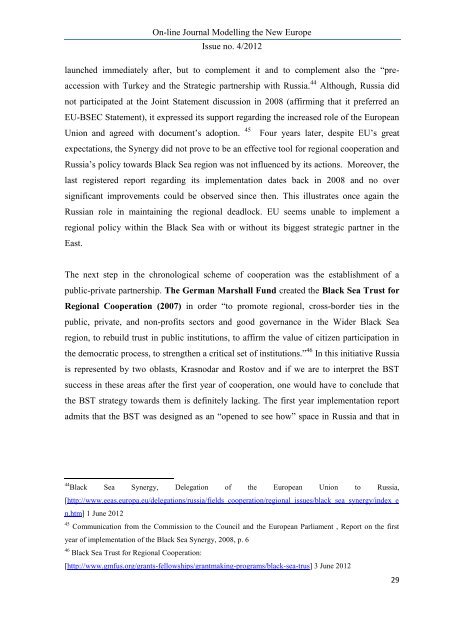On-line journal no. 4 – July 2012 - Modelling the New Europe
On-line journal no. 4 – July 2012 - Modelling the New Europe
On-line journal no. 4 – July 2012 - Modelling the New Europe
Create successful ePaper yourself
Turn your PDF publications into a flip-book with our unique Google optimized e-Paper software.
<strong>On</strong>-<strong>line</strong> Journal <strong>Modelling</strong> <strong>the</strong> <strong>New</strong> <strong>Europe</strong><br />
Issue <strong>no</strong>. 4/<strong>2012</strong><br />
launched immediately after, but to complement it and to complement also <strong>the</strong> “pre-<br />
accession with Turkey and <strong>the</strong> Strategic partnership with Russia. 44 Although, Russia did<br />
<strong>no</strong>t participated at <strong>the</strong> Joint Statement discussion in 2008 (affirming that it preferred an<br />
EU-BSEC Statement), it expressed its support regarding <strong>the</strong> increased role of <strong>the</strong> <strong>Europe</strong>an<br />
Union and agreed with document’s adoption. 45 Four years later, despite EU’s great<br />
expectations, <strong>the</strong> Synergy did <strong>no</strong>t prove to be an effective tool for regional cooperation and<br />
Russia’s policy towards Black Sea region was <strong>no</strong>t influenced by its actions. Moreover, <strong>the</strong><br />
last registered report regarding its implementation dates back in 2008 and <strong>no</strong> over<br />
significant improvements could be observed since <strong>the</strong>n. This illustrates once again <strong>the</strong><br />
Russian role in maintaining <strong>the</strong> regional deadlock. EU seems unable to implement a<br />
regional policy within <strong>the</strong> Black Sea with or without its biggest strategic partner in <strong>the</strong><br />
East.<br />
The next step in <strong>the</strong> chro<strong>no</strong>logical scheme of cooperation was <strong>the</strong> establishment of a<br />
public-private partnership. The German Marshall Fund created <strong>the</strong> Black Sea Trust for<br />
Regional Cooperation (2007) in order “to promote regional, cross-border ties in <strong>the</strong><br />
public, private, and <strong>no</strong>n-profits sectors and good governance in <strong>the</strong> Wider Black Sea<br />
region, to rebuild trust in public institutions, to affirm <strong>the</strong> value of citizen participation in<br />
<strong>the</strong> democratic process, to streng<strong>the</strong>n a critical set of institutions.” 46 In this initiative Russia<br />
is represented by two oblasts, Kras<strong>no</strong>dar and Rostov and if we are to interpret <strong>the</strong> BST<br />
success in <strong>the</strong>se areas after <strong>the</strong> first year of cooperation, one would have to conclude that<br />
<strong>the</strong> BST strategy towards <strong>the</strong>m is definitely lacking. The first year implementation report<br />
admits that <strong>the</strong> BST was designed as an “opened to see how” space in Russia and that in<br />
44 Black Sea Synergy, Delegation of <strong>the</strong> <strong>Europe</strong>an Union to Russia,<br />
[http://www.eeas.europa.eu/delegations/russia/fields_cooperation/regional_issues/black_sea_synergy/index_e<br />
n.htm] 1 June <strong>2012</strong><br />
45 Communication from <strong>the</strong> Commission to <strong>the</strong> Council and <strong>the</strong> <strong>Europe</strong>an Parliament , Report on <strong>the</strong> first<br />
year of implementation of <strong>the</strong> Black Sea Synergy, 2008, p. 6<br />
46 Black Sea Trust for Regional Cooperation:<br />
[http://www.gmfus.org/grants-fellowships/grantmaking-programs/black-sea-trus] 3 June <strong>2012</strong><br />
29


